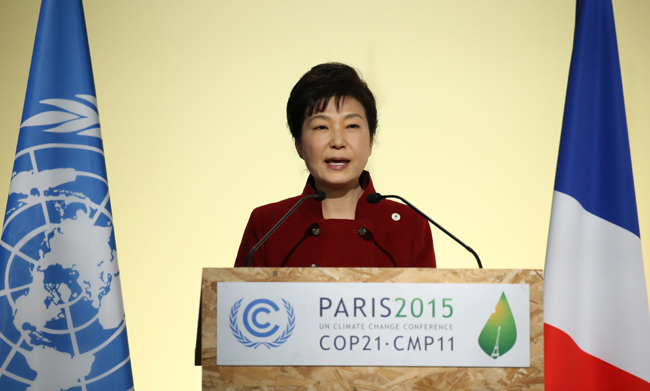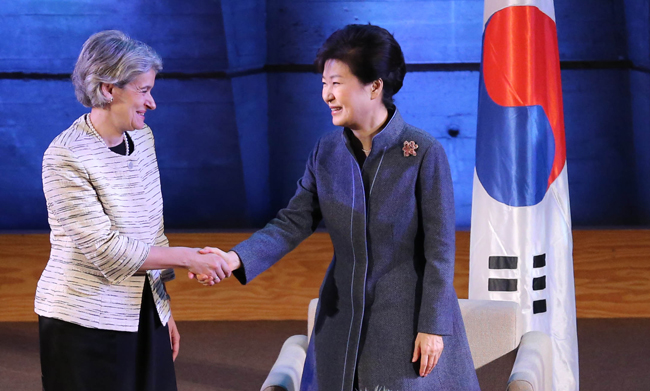- California Assembly OKs highest minimum wage in nation
- S. Korea unveils first graphic cigarette warnings
- US joins with South Korea, Japan in bid to deter North Korea
- LPGA golfer Chun In-gee finally back in action
- S. Korea won’t be top seed in final World Cup qualification round
- US men’s soccer misses 2nd straight Olympics
- US back on track in qualifying with 4-0 win over Guatemala
- High-intensity workout injuries spawn cottage industry
- CDC expands range of Zika mosquitoes into parts of Northeast
- Who knew? ‘The Walking Dead’ is helping families connect
Clean energy is Korea’s new growth engine

President Park Geun-hye delivers a speech at the COP21, United Nations Climate Change Conference, in Le Bourget, outside Paris, Monday. She vowed to create a 100 trillion won energy market that will hire 500,000
more by 2030. (Yonhap)
Park calls for global citizenship education in 1st UNESCO speech by Korean President
By Kang Seung-woo
President Park Geun-hye has set her sights on investing in new energy businesses as a growth engine for Korea, turning the climate challenge into an opportunity.
Her plan is expected to boost the nation’s status in the global fight against climate change and in the global new and renewable energy industry, all of which can facilitate the expansion of local companies overseas, Cheong Wa Dae said.
The energy industry is regarded around the world as a “blue ocean” or uncharted market.
According to the President, the government’s efforts will help create a 100 trillion won market and create 500,000 jobs by 2030.
About 40,000 delegates from 195 countries, including about 150 world leaders, gathered at the ongoing Paris climate change conference in a bid to produce a legally binding accord to maintain global warming at below 2 degrees Celsius over preindustrial temperatures.
Park, who has maintained that the response to climate change should be viewed as “an opportunity to secure a new growth engine, not a burden,” outlined her plan Monday at the United Nations Climate Change Conference, also known as the 21st Conference of the Parties, that will run through Dec. 11.

President Park Geun-hye shakes hands with UNESCO Director-General Irina Bokova during their meeting at its headquarters in Paris, Tuesday. (Yonhap)
The new energy business models that Park announced include establishing an energy prosumer market constructing zero-energy buildings and smart factories. She also said the nation will seek to make Jeju a carbon-free island.
An energy prosumer market refers to one that enables anyone independently to generate, consume and sell electricity through small-scale distributed power generation using renewable and ICT information and communications technologies.
Zero-energy buildings will be mandated in phases starting in 2025 and large plants will eventually be transformed into smart factories that harness ICT by 2030, according to Park.
The southern resort island of Jeju will move toward being carbon-free by replacing all conventional cars with electric vehicles and meeting 100 percent of its energy needs through renewable sources by 2030.
“These efforts would enable us unlock a new market valued in the neighborhood of 100 trillion won by the year 2030 and generate some 500,000 jobs,” Park said in her keynote speech.
Park’s plan to share the nation’s know-how about new energy business models and clean energy technologies, such as “energy-independent islands” and “smart farms,” with developing countries via the Green Climate Fund (GCF) has also drawn global attention, especially as Korea promises to ensure the new climate regime’s success.
The so-called smart farms that Korea has been promoting as a new GCF-supported model are aimed at improving the medical and biotechnology manufacturing and farming industries.
“As the new climate system requires developing countries’ voluntary, aggressive participation, Korea is stepping up efforts to bridge the difference between developed and developing countries over a new climate treaty,” Park’s office said in a statement.
While the climate conference is seeking to create a legally binding pact, developing countries complain that they are being given equal obligations with developed nations that they claim are responsible for climate change in the first place.
After the conference, President Park visited the Decorative Arts Museum showcasing the Korea Now exhibition of 1,500 pieces of Korean arts, crafts and designs by 151 artists, artisans, and fashion and graphic designers, which is being held as part of the “Years 2015-2016 of Korea-France Bilateral Exchanges.” Next year will mark the 130th anniversary of diplomatic ties between the two countries.
The exhibit is also displaying the Korean traditional attire, or “hanbok that Park wore during her inauguration in 2013.
The exhibition that kicked off on Sept. 18 is scheduled to run through Jan. 3, 2016 — the first time for the museum to hold such a long-term display on one country’s arts and crafts.
“I hope that the exhibition will play a role in boosting cultural exchanges between the two countries,” Park said.
She also hoped that Korean artwork can comfort the French people who were devastated by the terrorist attacks.
On Tuesday, during her visit to UNESCO, Park stressed the importance of global citizenship education (GCE) as a solution to ending violent extremism.
It was the first time a Korean president has visited UNESCO and delivered a speech. The president’s visit took place as part of the organization’s 70th anniversary.
GCE is a form of civic learning that involves students’ participation in projects that address global issues. At the World Education Forum held in May in Korea, GCE was declared as a global goal over the next 15 years.
The president’s emphasis came two weeks after the Islamic State (IS) conducted deadly terror attacks on Nov. 13 in Paris that left 130 people dead and more than 130 wounded.
“There is no better way to construct the defenses of peace that will stand the test of time than to sow in the minds of children in conflict zones the seeds of reconciliation over hatred, dialogue over violence, and hope over despair,” Park said.
“I believe the answer lies in none other than education, and that accordingly, global citizenship education must be disseminated and strengthened further,”
According to Cheong Wa Dae, since 2011 through the project, Korea has helped five African countries _ Malawi, Zambia, Botswana, Namibia and the Democratic Republic of the Congo _ develop and distribute textbooks. The first phase of the project is set to end in 2016, and in the second phase, with a budget of $11.8 million, Korea plans to help five more African countries.
Korea also agreed to widen its partnership with UNESCO and to be part of, the “Better Life for Girls” initiative to improve access to education and healthcare services in developing countries.
Park also stressed the importance of inter-Korean cultural cooperation to achieve Korean unification.
“To bring us closer to peaceful reunification, I propose that we open three corridors of cooperation between the South and the North that are oriented to the environment, people’s livelihood and culture,” she said. “The cultural corridor, in particular, will become a focal point for restoring a sense of common identity as one people.”
Park observed the signing of a memorandum of understanding to streamline and focus cooperation between UNESCO and Korea, and an agreement to establish an International Center of Martial Arts for Youth Development and Engagement under UNESCO auspices.

















Pingback: Southern Martial Arts Centre Bomaderry | selfdefenselessons
Pingback: Parks Martial Arts Woodinville Wa | equipment - wing chun
Pingback: What Is The Difference Between Electrical Energy/mechanical Energy | airport - aircraft electrician jobs
Pingback: Martial Arts Energy Attacks | body camera
Pingback: What Is The Difference Between Electrical Energy/mechanical Energy | info - handbook of electrical engineering
Pingback: U S Martial Arts Center Olympia Wa | wing - wing chun
Pingback: Martial Arts Scarborough Wa | boxing - boxingclasses
Pingback: Wing Chun Olympia Washington | martial arts supplies